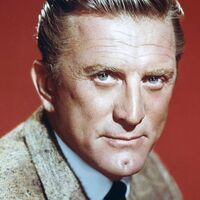Kirk Douglas
Relevance
On Kirk's death, Morrissey stated:
"Kirk Douglas dies … the soul goes over … someone kiss his eyelids shut … the greatest American actor who ever lived … the very first actor to whom no rules applied … the only actor to elevate every screen minute - whilst other actors collected their Oscars for doing something already done by somebody else … this sadness is unimaginable … death must always be the next event … masoned, carved, polished, sanded … Kirk Douglas was as good as it could possibly ever be - a life of tender service to Art … of service to all of us." Morrissey.
Image from the film "Champion" (1949) used as a 2000 backdrop (source):
Letter from Kirk dated 2013 to Morrissey (shared in 2020):
Mentioned In
Wikipedia Information
 |
Kirk Douglas (born Issur Danielovitch; December 9, 1916 – February 5, 2020) was an American actor and filmmaker. After an impoverished childhood, he made his film debut in The Strange Love of Martha Ivers (1946) with Barbara Stanwyck. Douglas soon developed into a leading box-office star throughout the 1950s, known for serious dramas, including westerns and war films. During his career, he appeared in more than 90 films and was known for his explosive acting style. He was named by the American Film Institute the 17th-greatest male star of Classic Hollywood cinema. Douglas played an unscrupulous boxing hero in Champion (1949), which brought him his first nomination for the Academy Award for Best Actor. His other early films include Out of the Past (1947); Young Man with a Horn (1950), playing opposite Lauren Bacall and Doris Day; Ace in the Hole (1951); and Detective Story (1951), for which he received a Golden Globe nomination. He received his second Oscar nomination for his dramatic role in The Bad and the Beautiful (1952), opposite Lana Turner, and earned his third for portraying Vincent van Gogh in Lust for Life (1956), a role for which he won the Golden Globe for the Best Actor in a Drama. He also starred with James Mason in the adventure 20,000 Leagues Under the Sea (1954), a large box-office hit. In September 1949, he established Bryna Productions, which began producing films as varied as Paths of Glory (1957) and Spartacus (1960). In those two films, he collaborated with the then relatively unknown director Stanley Kubrick, taking lead roles in both films. Douglas helped to break the Hollywood blacklist by having Dalton Trumbo write Spartacus with an official on-screen credit. He produced and starred in Lonely Are the Brave (1962) and Seven Days in May (1964), the latter opposite Burt Lancaster, with whom he made seven films. In 1963, he starred in the Broadway play One Flew Over the Cuckoo's Nest, a story that he purchased and later gave to his son Michael Douglas, who turned it into an Oscar-winning film. Douglas continued acting into the 1980s, appearing in such films as Saturn 3 (1980), The Man from Snowy River (1980), Tough Guys (1986), a reunion with Lancaster, and in the television version of Inherit the Wind (1988) plus in an episode of Touched by an Angel in 2002, for which he received his third nomination for an Emmy Award. As an actor and philanthropist, Douglas received an Academy Honorary Award for Lifetime Achievement and the Presidential Medal of Freedom. As an author, he wrote ten novels and memoirs. After barely surviving a helicopter crash in 1991 and then suffering a stroke in 1996, he focused on renewing his spiritual and religious life. He lived with his second wife, producer Anne Buydens, until his death in 2020. A centenarian, Douglas was one of the last surviving stars of the film industry's Golden Age.
Related Forum Threads
- [Morrissey Central] "You Must Please Remember" (February 8, 2020) - Morrissey-solo (Feb 08, 2020)
- [Morrissey Central] NOW MY HEART IS EMPTY (statement on Kirk Douglas death, Feb. 6, 2020) - Morrissey-solo (Feb 06, 2020)


